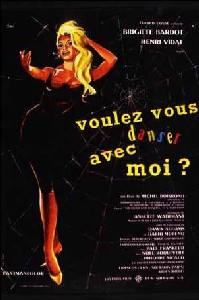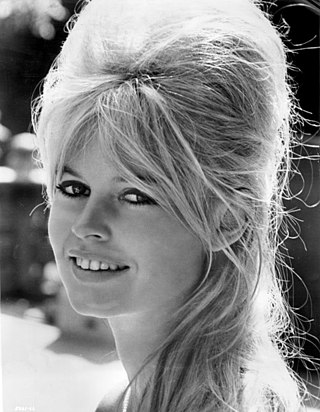
Brigitte Anne-Marie Bardot, often referred to by her initials B.B., is a French animal rights activist and former actress, singer, and model. Famous for portraying sexually emancipated characters, often with hedonistic lifestyles, she was one of the best known activists in the sexual revolution of the 1950s–1970s. Although she withdrew from the entertainment industry in 1973, she remains a major popular culture icon and a noted figure in ushering in the sexual revolution. She has acted in 47 films, performed in several musicals, and recorded more than 60 songs. She was awarded the Legion of Honour in 1985.

Serge Gainsbourg was a French singer-songwriter, actor, composer, and director. Regarded as one of the most important figures in French pop, he was renowned for often provocative releases which caused uproar in France, dividing public opinion. His artistic output ranged from his early work in jazz, chanson, and yé-yé to later efforts in rock, zouk, funk, reggae, and electronica. Gainsbourg's varied musical style and individuality make him difficult to categorise, although his legacy has been firmly established and he is often regarded as one of the world's most influential popular musicians.

Jane Mallory Birkin was a British and French actress and singer. She had a decade-long musical and romantic partnership with Serge Gainsbourg. She also had a prolific career as an actress, mostly in French cinema.
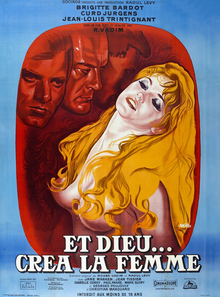
And God Created Woman is a 1956 French romantic drama film directed by Roger Vadim in his directorial debut and starring Brigitte Bardot. Though not her first film, it is widely recognized as the vehicle that launched Bardot into the public spotlight and immediately created her "sex kitten" persona, making her an overnight sensation.

Sylvia Lopez was a French model and actress.

Anita Louise Lane was an Australian singer-songwriter who was briefly a member of the Bad Seeds with Nick Cave and Mick Harvey and collaborated with both bandmates. Lane released two solo albums, Dirty Pearl (1993) and Sex O'Clock (2001).

Contempt is a 1963 French New Wave drama film written and directed by Jean-Luc Godard, based on the 1954 Italian novel Il disprezzo by Alberto Moravia. It stars Brigitte Bardot, Michel Piccoli, Jack Palance, Fritz Lang, and Giorgia Moll.
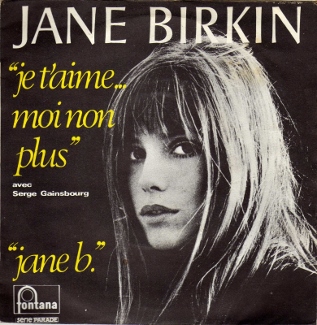
"Je t'aime... moi non plus" is a 1967 song written by Serge Gainsbourg for Brigitte Bardot. In 1969, Gainsbourg recorded the best known version as a duet with English actress Jane Birkin. Although this version reached number one in the UK—the first foreign-language song to do so—and number two in Ireland, it was banned in several countries due to its overtly sexual content.

David Arugete, commonly known under his stage name Darío Moreno, was a Turkish-Jewish polyglot singer, an accomplished composer, lyricist, and guitarist. He attained fame and made a remarkable career centred in France which also included films, during the 1950s and the 1960s. He became famous with his 1961 song Brigitte Bardot.

Please, Not Now! (original French title La Bride sur le cou, is a French comedy film released in 1961, directed by Roger Vadim and starring his former wife, Brigitte Bardot.

A Very Private Affair is a 1962 French romantic drama film directed by Louis Malle and starring Brigitte Bardot.

Viva Maria! is a 1965 adventure comedy film starring Brigitte Bardot and Jeanne Moreau as two women named Maria who meet and become revolutionaries in the early 20th century. It also starred George Hamilton as Florès, a revolutionary leader. It was co-written and directed by Louis Malle, and filmed in Eastman Color. The costumes were by Pierre Cardin.

"Bonnie and Clyde" is a 1968 French-language song written by Serge Gainsbourg, and performed by Gainsbourg and Brigitte Bardot. The song tells the story of the outlaw couple Bonnie and Clyde. It is based on an English language poem written by Bonnie Parker herself a few weeks before she and Clyde Barrow were shot, entitled "The Trail's End". It was released on two albums in 1968: Gainsbourg's album Initials B.B., and Gainsbourg and Bardot's album Bonnie and Clyde.

Mio figlio Nerone, released in the US as Nero's Mistress is a 1956 Italian historical comedy film directed by Steno and starring Alberto Sordi, Vittorio De Sica, Gloria Swanson and Brigitte Bardot, with cinematography by Mario Bava. It depicts a visit by the Roman Emperor Nero and his entourage to a coastal villa.

Babette Goes to War is a 1959 French CinemaScope film starring Brigitte Bardot. It was Bardot's first movie since becoming a star where she did not take off her clothes.
Christian Gérard Mazas, known as Christian-Gérard, was a French stage and film actor as well as theater director.
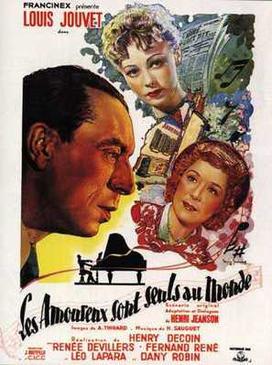
Monelle is a 1948 French drama film directed by Henri Decoin and starring Louis Jouvet, Renée Devillers and Dany Robin. It was shot at the Billancourt Studios in Paris and on location in the city. The film's sets were designed by the art director Emile Alex
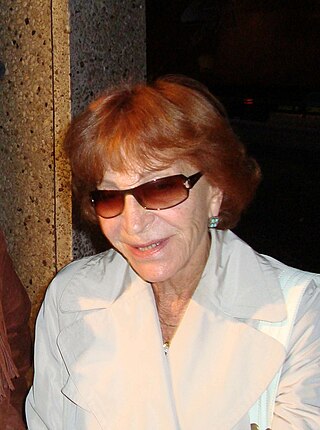
Maria Pacôme was a French actress and playwright.
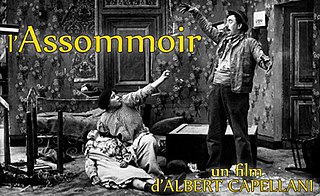
L'Assommoir(English: The Drinking Den) is a 1909 French drama film directed by Albert Capellani, adapting the eponymous 1879 play by William Busnach et Octave Gastineau, itself based on the 1877 novel by Emile Zola. It is the first French feature-length film and the second produced by the Société cinématographique des auteurs et gens de lettres (SCAGL) [fr].
